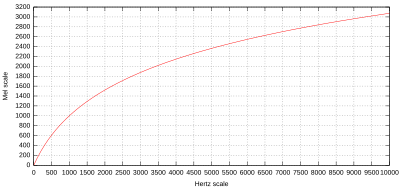メル尺度
メル尺度(メルしゃくど、英語: mel scale)は、音高の知覚的尺度である。メル尺度の差が同じであれば、人間が感じる音高の差が同じになることを意図している。
1937年、Stanley Smith Stevens、John Volkman、Edwin Newman が提案した[1]。この尺度と通常の周波数測定値との基準点として、1000Hzの音(聴取者のしきい値から40dB上)を1000メル (mels) の音高と定義する。約500Hzより高くなると、音高が同じだけ増加したと感じる音程(音高の差)は大きくなっていく。結果として、周波数で4オクターヴ上がる間にメル尺度では2オクターヴしか上がらない。メル (mel) という名称は、「メロディ (melody)」に由来し、音高の比較に基づく尺度であることを示している。
換算式
[編集]
周波数パラメータの取り方によりいくつかの変種があるが、周波数 をメル尺度 に変換する一般式は
で、逆変換は
である。 は自由パラメータの周波数パラメータで、 は「1000 Hz は1000メル」という制約から導かれる式
で算出される従属パラメータである。
これらの式から、
- 周波数≪周波数パラメータ なら、メル尺度は周波数にほぼ比例する。
- 周波数が増えるほど、メル尺度の増え方は緩慢になる。
- 周波数≫周波数パラメータ なら、メル尺度はほぼ周波数の対数の一次関数になる。
などがわかる。
式は周波数パラメータのみによって決まり、よく使われる式には
- (Stevens & Volkman 1940; Beranek 1949; O’Shaughnessy 1987)
- (Fant 1968)
- (Lindsay & Norman 1977)
がある。
関連項目
[編集]参考文献
[編集]- ^ Journal of the Acoustical Society of America 8(3) 185–190
- Beranek, Leo L. (1949). Acoustic measurements. New York: McGraw-Hill.
- Fant, Gunnar. (1968). Analysis and synthesis of speech processes. In B. Malmberg (Ed.), Manual of phonetics (pp. 173-177). Amsterdam: North-Holland.
- Lindsay, Peter H.; & Norman, Donald A. (1977). Human information processing: An introduction to psychology (2nd ed.). New York: Academic Press.
- O'Shaughnessy, Douglas. (1987). Speech communication: Human and machine. Reading, MA: Addison-Wesley.
- Stevens, Stanley Smith; Volkman; John; & Newman, Edwin. (1937). A scale for the measurement of the psychological magnitude of pitch. Journal of the Acoustical Society of America, 8 (3), 185–190.
外部リンク
[編集]- Hz/mel, mel/Hz conversion (Stevens & Volkman の式を使用)
- J. Acoust. Soc. Am. table of contents
- Handbook for Acoustic Ecology










